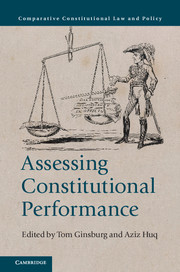Book contents
- Frontmatter
- Contents
- List of figures
- List of tables
- List of contributors
- Acknowledgments
- INTRODUCTION
- PART I DEFINING CONSTITUTIONAL PERFORMANCE
- PART II MANAGING SPECIFIC CONSTITUTIONAL CHALLENGES
- PART III CASE STUDIES
- 11 Ambedkar's constitution: Promoting inclusion, opposing majority tyranny
- 12 Assessing the Constitution of Kenya 2010 five years later
- 13 The Arab Spring constitutions: For whose benefit?
- 14 Stability in flexibility: A British lens on constitutional success
- Index
- References
13 - The Arab Spring constitutions: For whose benefit?
from PART III - CASE STUDIES
Published online by Cambridge University Press: 05 August 2016
- Frontmatter
- Contents
- List of figures
- List of tables
- List of contributors
- Acknowledgments
- INTRODUCTION
- PART I DEFINING CONSTITUTIONAL PERFORMANCE
- PART II MANAGING SPECIFIC CONSTITUTIONAL CHALLENGES
- PART III CASE STUDIES
- 11 Ambedkar's constitution: Promoting inclusion, opposing majority tyranny
- 12 Assessing the Constitution of Kenya 2010 five years later
- 13 The Arab Spring constitutions: For whose benefit?
- 14 Stability in flexibility: A British lens on constitutional success
- Index
- References
Summary
Who decides what a constitution's purpose should be?
A UNIVERSAL TEST
Scholars and practitioners have long struggled to identify what qualities make a constitution successful. The question is incredibly complex, not least because there is very little consensus on what constitutions should look like, or on the areas that constitutions should deal with. In an effort to resolve this issue, there is a natural tendency amongst many scholars to favor a “universal test,” that is, a single set of criteria that can be applied universally to measure the performance of all constitutions. While such an approach is certainly tempting, not least of all because of its simplicity, there are at least two sets of reasons that we should question its applicability in all cases.
The first is related to the fact that any attempt to establish external criteria will necessarily have to remain as general as possible. Constitutions are enacted in countries with widely varying starting points and are also subject to be influenced by a multiplicity of factors. A constitution can be enacted for the purpose of ending violent conflict (e.g. Bosnia), alleviating poverty (e.g. Ecuador) or transforming a previously discriminatory society into a more egalitarian one (e.g. South Africa), while others are designed merely to streamline government in what is already an effectively administered state (e.g. Switzerland). Some constitutions are well constructed but are applied in states that barely survive in unstable regions and that are subject to overbearing and negative foreign influence (e.g. Yemen), while others still are applied in countries that exist within a broader state of peace and economic development (e.g. Spain).
In that context, the only way to measure constitutional performance through the use of a universal test would be to ignore each country's nuances and idiosyncrasies and to remain focused on general objectives. The alternative would simply be unworkable: If we were to apply a narrow set of criteria to evaluate constitutions, the result would be that many of those individual tests would simply be inapplicable to a large number of contexts. For example, a universal test that measures constitutions’ success in promoting racial equality would be inapplicable in Tunisia, which is racially homogeneous.
- Type
- Chapter
- Information
- Assessing Constitutional Performance , pp. 365 - 392Publisher: Cambridge University PressPrint publication year: 2016
References
- 1
- Cited by



